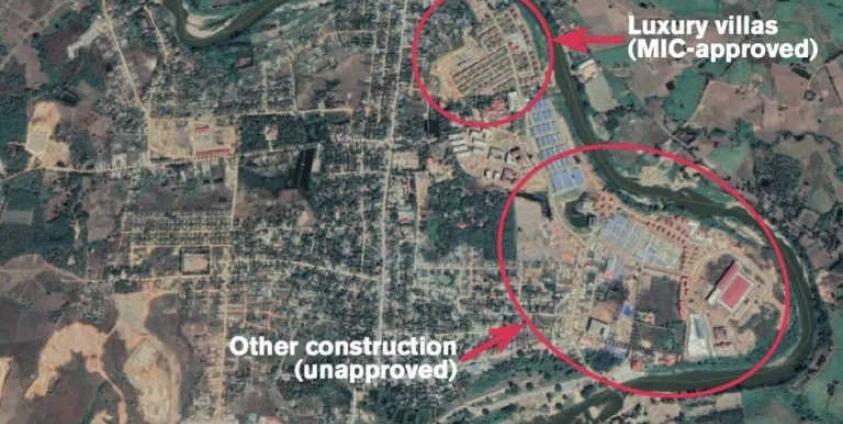A new report titled “Gambling Away Our Land” published by the Karen Peace Support Network (KPSN) details how a mega development known as the Shwe Kokko project will have no benefit for local Karen people, and will serve only the interests of transnational gambling mafias and Burma’s ruling military.
Shwe Kokko ‘New City’, is a massive Macao-style casino complex development project being built on indigenous Karen territory at the Thai-Burma border, about ten miles north of Myawaddy.
KPSN began researching the development project in June of last year. According to their report, the mega-project development began in 2017, and is being led by the Hong Kong-based Yatai International Holding Group in partnership with Colonel Chit Thu, the leader of the Karen Border Guard Forces (BGF).
Shwe Kokko is also referred to with the official sounding name, “Myanmar Yatai Shwe Kokko Special Economic Zone.” However, there are only three officially recognized Special Economic Zones (SEZ) in Burma: at Thilawa, Dawei and Kyaukphyu. Investment in these zones, by the Japanese, Thai and Chinese respectively, has been well-publicized.

Gambling Away Our Lands: Naypyidaw's "Battlefields to Casinos" Strategy in Shwe KokkoGambling Away Our Lands: Naypyidaw’s “Battlefields to Casinos” Strategy in Shwe Kokko (Cover Photo/Report by KPSN)
The KPSN report notes that there are specific laws and rules that must be followed for a SEZ to be established in the country, involving relevant government departments from Nap Pyi Daw. The report points out there is no evidence these laws or rules have been followed in the establishment of the Yatai Shwe Kokko Special Economic Zone.
Under Burma’s SEZ Law, developers are given a land use permit of 50 years, extendable for another 25 years. However, KPSN reports the lease for Shwe Kokko is for 70 years, and is extendable to 99 years.
Although there has been a formal agreement from the Myanmar Investment Commission (MIC) – signed on July 30 2018, it was limited to the construction of 59 luxury villas on 25.5 acres (out of 62 acres) of land at a cost of 22.5 million USD, and was to be completed by 2021.
Google satellite imagery taken from November 2019 shows the construction at Shwe Kokko has far exceeded what was permitted under the July 2018 MIC contract. What has now been developed covers well over 100 acres.
Not only has land been confiscated from villagers in the area for the mega city development dating back to 2017, but 1000’s of workers from China have been brought into the region to build apartment blocks, villas, casinos and hotels.
Overall the “New City” aka Shwe Kokko project is expected to cover nearly 30,000 acres, stretching twelve miles along the border, and estimated to cost 15 billion dollars.
The developer Yatai International Holding Group describes their project as the creation of a high-tech “International City” integrating “science and technology, gambling and entertainment, tourism, culture and agriculture.” The company projects that within 5-10 years the city’s Technology and Industry District would become “the centre for technology industry in Myanmar.”
KPSN sees things differently, saying the company running the project “appears to be just a front for a regional on-line gambling operaation, who have made their fortunes from similar ventures in the Philippines and Cambodia. They do not appear to have any formal links to the Chinese government, but are hand in glove with the Burma Army authorities in implementing the project – outside regular legal frameworks.”
The scale of the construction, a growing number of Chinese and concerns that the influx of numerous on-line gambling casinos could become a money laundering hub, has garnered international media attention.
The Karen State Government began an investigation in May 2019 that uncovered a breach in investment regulations.
Shortly after the investigation, Colonel Chit Thu announced the project was being temporarily suspended, in late August 2019, However, drone footage of the area provided to the Office of Federation of Thai Industries in Mae Sot in October 2019 clearly showed construction was progressing significantly despite the temporary suspension order. Locals from the area have also verified construction has been on-going.
The KPSN report raises some pointed questions. How was it possible for such a massive development to proceed to this point without the knowledge and tacit approval of authorities in Naw Pyi Daw?
Border area developments do fall under the authority of the Burma Army controlled Border Affairs Ministry, whose primary function is “To designate special development zones for the development of border areas and national races. ”
The KPSN report speculates the Shwe Kokko project may have received approvals to proceed by order of this ministry.
The Karen Peace Support Network’s spokesperson, Saw Lay Ka Baw said, “there are a lot of armed groups in the Shwe Kokko area. Conflict remains here. The development of the area by the Tatmadaw is detrimental to peace when holding peace talks, or federalism talks, and at the time when the needs of the Karen people cannot be determined by political aspirations.”
Saw Lay says that the Shwe Kokko project is also a barrier to peace because the indigenous people are not able to manage their land and resources according to the federal constitution.
The Karen National Union (KNU) General Secretary, Padoh Ta Doh Moo explained to the Karen News media “The KNU do not accept mega development projects costing billions of dollars that are of no benefit to our community. We are now against any mega project and our position is that no mega project should be implemented while we are in the ceasefire period and are working towards a peace agreement.”
The KPSN report suggests “For Burma Army leaders, the project is a win-win: cementing control of this contested Karen territory, while gaining huge financial rewards.”
The Karen Peace Support Network (KPSN) is on the largest networks of Karen civil society origination. The KPSN helps to work between organizations to address the Karen people’s human rights as well as the development and peace sectors.








